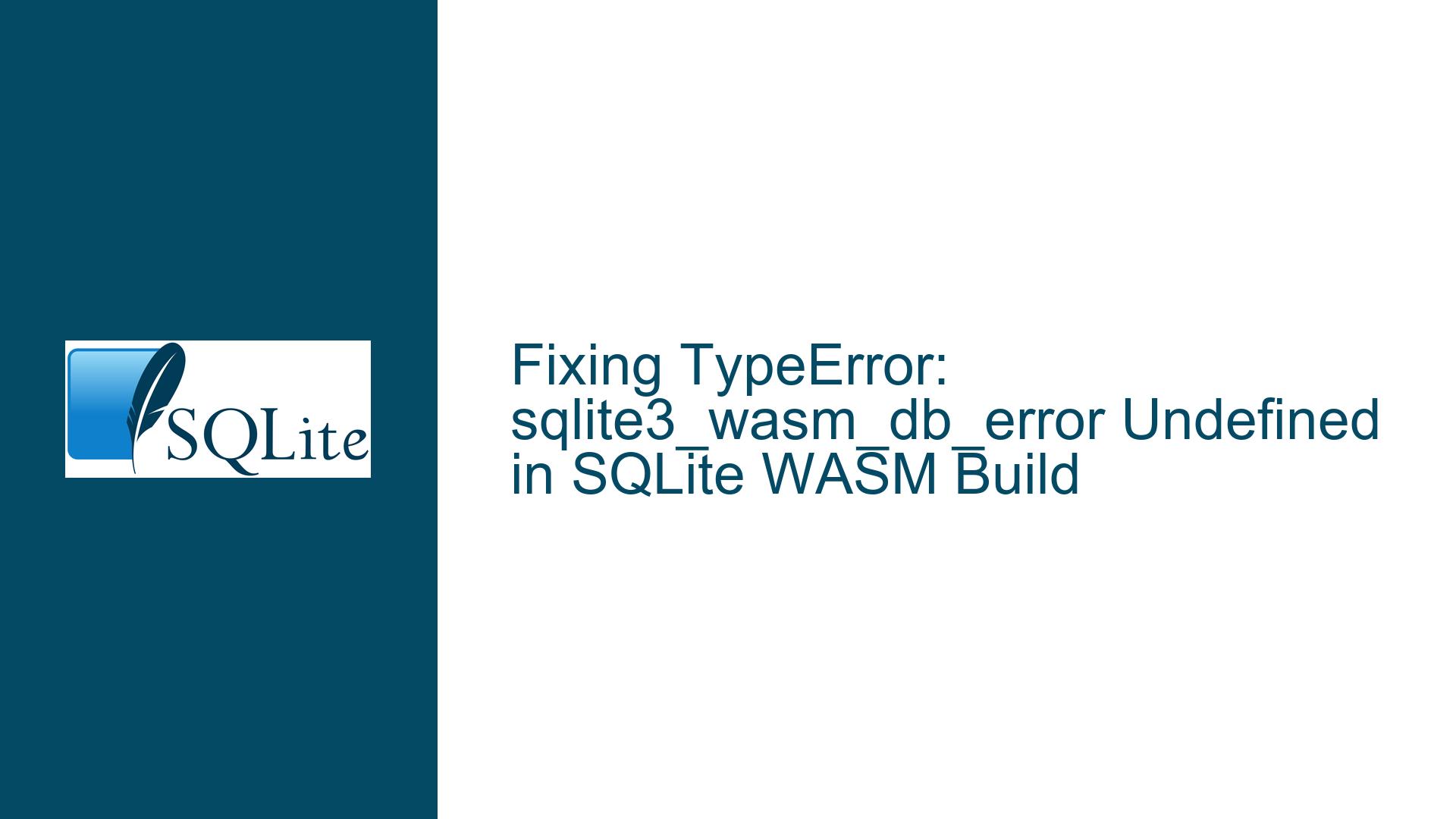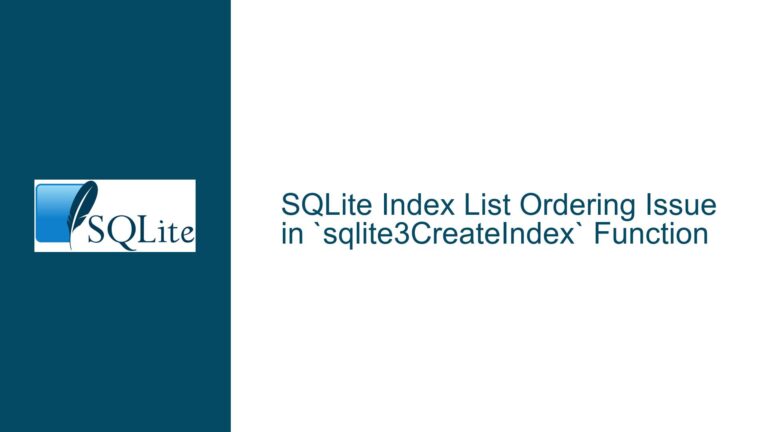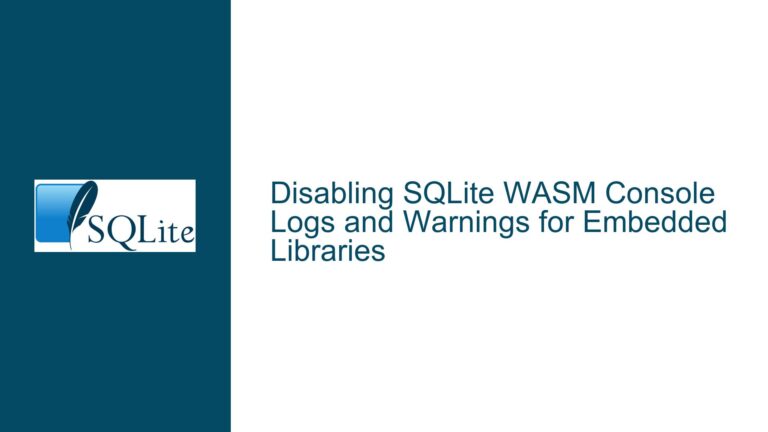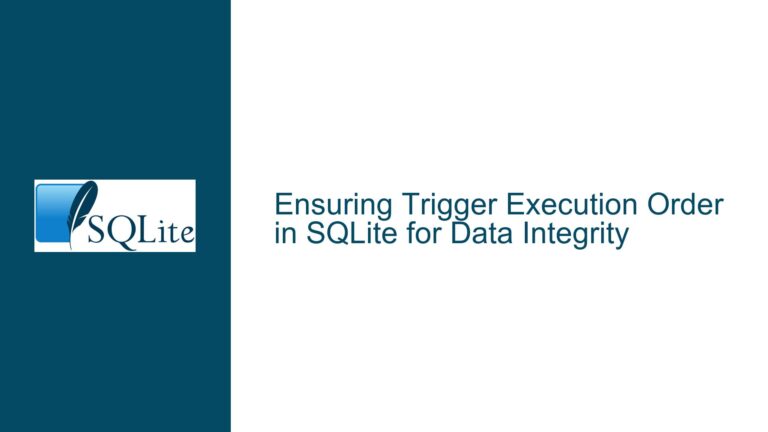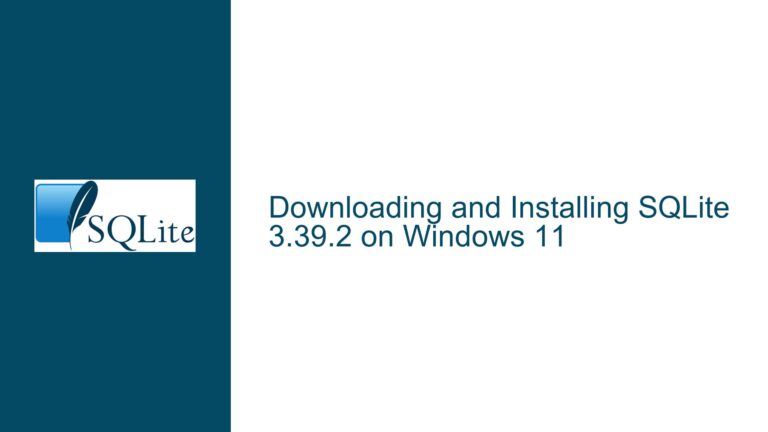Fixing TypeError: sqlite3_wasm_db_error Undefined in SQLite WASM Build
Issue Overview: TypeError in SQLite WASM Build Due to Incorrect Error Handling
The core issue revolves around a TypeError that occurs when using the SQLite WASM build, specifically when passing an invalid argument to a function. The error message, Cannot read properties of undefined (reading 'sqlite3_wasm_db_error'), indicates that the code is attempting to access a property (sqlite3_wasm_db_error) on an undefined object. This error is triggered during the error-reporting phase, which means that the system is unable to properly generate or display the intended error message due to a bug in the error-handling mechanism.
The problem manifests in a basic setup where the SQLite WASM module is initialized, and a database connection is established. When a function like sqlite.capi.sqlite3_prepare_v3 is called with an invalid argument, the system attempts to report an error but fails because the error-handling function itself is incorrectly referenced. Specifically, the code tries to access sqlite3.util.sqlite3_wasm_db_error, but the correct reference should be util.sqlite3_wasm_db_error. This discrepancy arises because the util namespace is removed at the end of the setup process, making the sqlite3.util prefix invalid during runtime.
The issue is further compounded by the fact that the SQLite WASM API does not inherently protect against misuse, such as passing invalid arguments. Instead, it relies on JavaScript’s native error-reporting mechanisms. However, in this case, the error-reporting mechanism itself is flawed, leading to a cascading failure where the system cannot properly report the initial error due to the incorrect reference.
Possible Causes: Misconfigured Error Handling and Namespace Issues
The primary cause of the TypeError is a misconfiguration in the error-handling code. The function __dbArgcMismatch is designed to report errors when the number of arguments passed to a function does not match the expected count. However, the function incorrectly references sqlite3.util.sqlite3_wasm_db_error instead of util.sqlite3_wasm_db_error. This incorrect reference leads to the TypeError because the sqlite3.util namespace is no longer valid after the initial setup process.
The util namespace is intended for internal use during the library’s bootstrapping phase. Once the setup process is complete, the util namespace is removed, and any references to it become invalid. The error-handling function, however, continues to use the sqlite3.util prefix, which results in the TypeError when the function is called.
Another contributing factor is the lack of robust argument validation in the SQLite WASM API. The API does not explicitly check for invalid arguments, relying instead on JavaScript’s native error-reporting mechanisms. While this approach can simplify the API, it also means that errors caused by invalid arguments may not be handled gracefully, especially if the error-handling mechanism itself is flawed.
The issue is further exacerbated by the fact that the error-handling function is called in response to an invalid argument. This creates a situation where the system is unable to report the initial error because the error-handling function itself is misconfigured. As a result, the user is left with a cryptic TypeError that does not provide meaningful information about the underlying issue.
Troubleshooting Steps, Solutions & Fixes: Correcting Error Handling and Ensuring Proper Namespace Usage
To resolve the TypeError and ensure proper error handling in the SQLite WASM build, the following steps can be taken:
Correct the Error-Handling Function Reference: The first and most critical step is to correct the reference to the
sqlite3_wasm_db_errorfunction in the__dbArgcMismatchfunction. The incorrect referencesqlite3.util.sqlite3_wasm_db_errorshould be replaced withutil.sqlite3_wasm_db_error. This change ensures that the function is correctly referenced during runtime, allowing the error-handling mechanism to function as intended.Validate Arguments Before Function Calls: To prevent errors caused by invalid arguments, it is advisable to implement argument validation before calling SQLite functions. This can be done by checking the number and type of arguments passed to a function and ensuring they match the expected values. If an invalid argument is detected, an error can be thrown or logged before the function is called, preventing the error-handling mechanism from being triggered unnecessarily.
Update the SQLite WASM Build: The issue is expected to be fixed in the upcoming SQLite 3.44 release or the next 3.43.x release. Once the updated build is available, it should be downloaded and integrated into the project. The updated build will include the corrected error-handling function reference, eliminating the
TypeErrorand ensuring that errors are reported correctly.Review and Test Error Handling: After making the necessary changes, it is important to thoroughly review and test the error-handling mechanism to ensure that it functions as expected. This includes testing with both valid and invalid arguments to verify that errors are reported correctly and that the system does not crash or produce cryptic error messages.
Monitor for Future Updates: The SQLite WASM build is actively maintained, and future updates may include additional improvements and bug fixes. It is important to monitor for updates and apply them as needed to ensure that the project remains stable and secure.
By following these steps, the TypeError can be resolved, and the SQLite WASM build can be configured to handle errors correctly. This will improve the overall stability and reliability of the application, ensuring that users receive meaningful error messages and that the system can recover gracefully from errors caused by invalid arguments.
In conclusion, the TypeError in the SQLite WASM build is caused by a misconfigured error-handling function that incorrectly references the sqlite3_wasm_db_error function. By correcting the function reference, validating arguments, updating the SQLite WASM build, and thoroughly testing the error-handling mechanism, the issue can be resolved, and the system can be configured to handle errors correctly. This will improve the overall stability and reliability of the application, ensuring that users receive meaningful error messages and that the system can recover gracefully from errors caused by invalid arguments.
